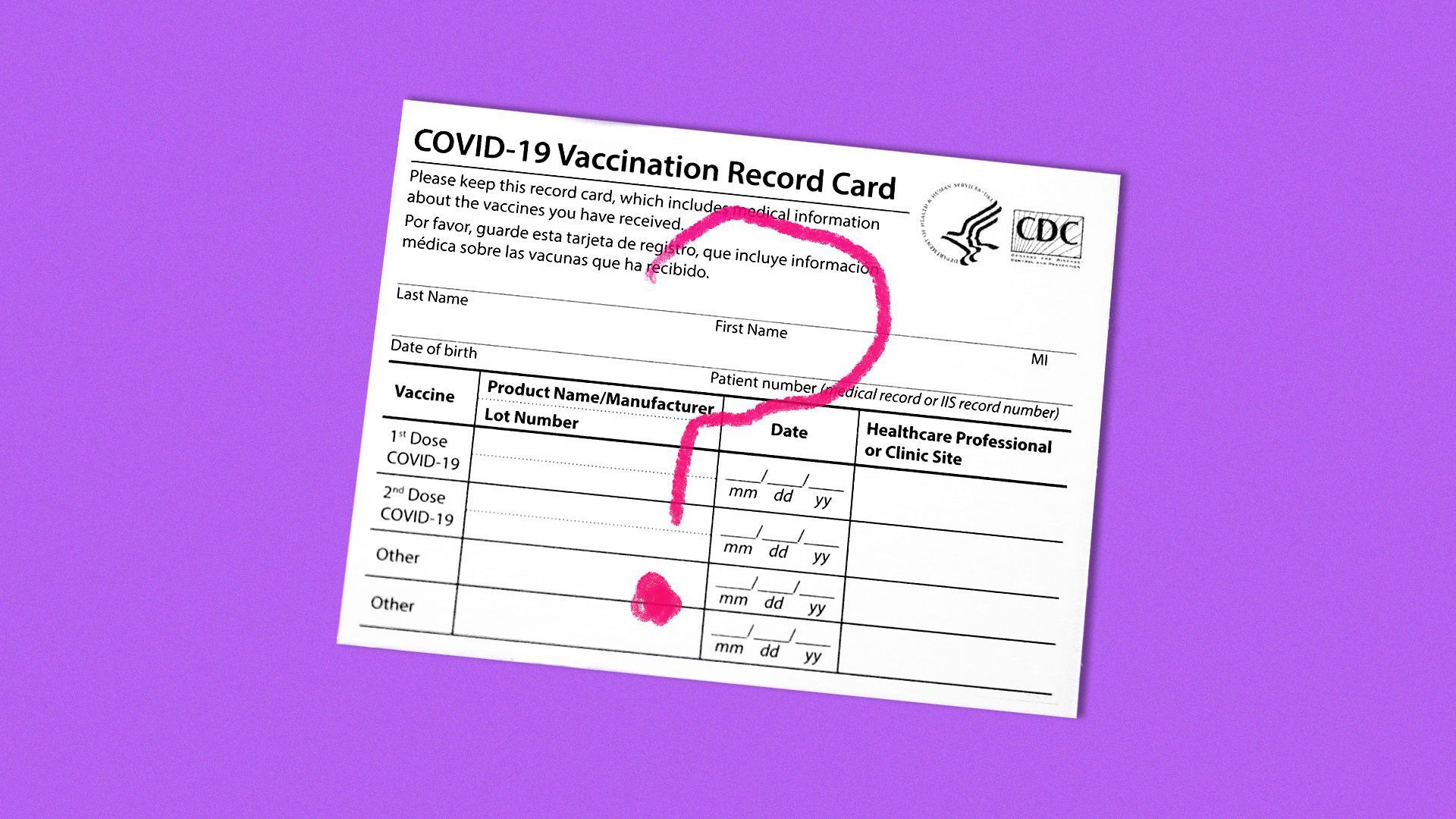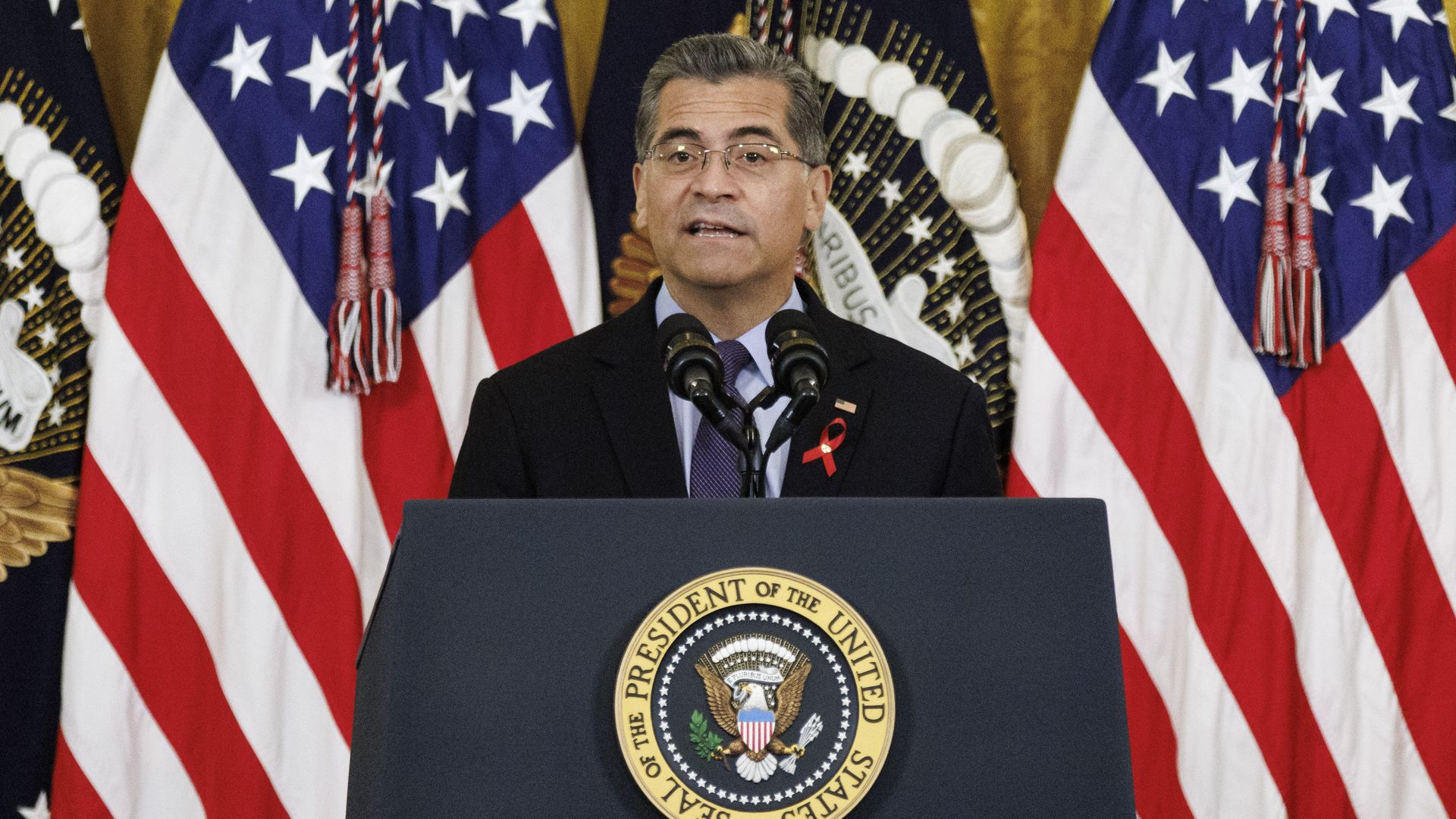| |
| |
| |
| Presented By PhRMA |
| |
| Axios Vitals |
| By Tina Reed ·Feb 07, 2022 |
| Good morning, Vitals readers. Today's newsletter is 757 words or a 3-minute read. We continue our look back at Black history in medicine ... 📙 Today, we remember Rebecca Lee Crumpler, who broke both racial and gender barriers when she became the first African American woman to earn a medical degree in 1864. (Yes, during the Civil War.) - She went on to publish the "Book of Medical Discourses," one of the very first medical publications by an African American author.
|
| |
| |
| 1 big thing: Another coronavirus vaccine dilemma |
 |
|
| Illustration: Gabriella Turrisi/Axios |
| |
| Federal health regulators will soon face their next controversial vaccine decision: whether to authorize Pfizer's vaccine for children younger than 5 despite ongoing questions around dosing and effectiveness, Axios' Caitlin Owens writes. Why it matters: Once again, the pandemic is forcing health officials to choose between unconventional vaccine approval methods and the human costs of abiding by more traditional — yet time-consuming — regulatory processes. State of play: At the request of the agency, Pfizer asked the FDA to authorize two doses of its coronavirus vaccine for emergency use in children between 6 months and 5 years old, even though the plan is for the vaccine to eventually be given as a three-dose series. - The company announced in December that two doses didn't produce an immune response that cleared the required threshold in children 2–4 years old, and it would test the third dose.
- Those results aren't expected until March, but giving two shots the go-ahead would allow parents to begin vaccinating kids — a months-long process — while data on the third dose is gathered.
Between the lines: Some experts worry that nuances about the vaccine haven't been communicated well. - The initial argument against authorizing two doses was that, although they were somewhat effective, three doses would be necessary. But "people latched on to the idea that an ineffective two-dose vaccine might be authorized," University of Pittsburgh professor Walid Gellad said.
- "The way the information on potential pediatric vaccine authorization has been rolled out is a problem — it has led to confusion, uncertainty, concern about integrity of the process," he added.
What we're watching: An FDA advisory board will meet Feb. 15 to consider whether to recommend authorizing two doses of the vaccine. Ultimately, the FDA and the CDC will have to weigh in before the shots can begin. Go deeper. |
    |
| |
| |
| 2. A new obstacle to COVID pill access |
 |
|
| Illustration: Sarah Grillo/Axios |
| |
| Some pharmacies are getting paid as little as $1 to dispense the COVID antiviral pills made by Pfizer and Merck, Axios' Bob Herman reports. Why it matters: Most pharmacies want to offer the drugs, especially the one from Pfizer that drastically cuts the odds of hospitalization and death. - But low payments could hurt Americans' ability to access the pills in some areas if pharmacies decide they can't afford to stock them.
What they're saying: Ilisa Bernstein, a lobbyist with the American Pharmacists Association, called the current fees "absolutely ridiculous" because they could take pharmacists up to 45 minutes to dispense. The other side: The Pharmaceutical Care Management Association, which lobbies on behalf of PBMs, did not make anyone available for an interview. - PCMA pointed to a blog post written by CEO JC Scott, which said PBMs are "stepping up, voluntarily, to cover dispensing fees for new oral anti-viral COVID medications ... which are not technically covered by Medicare and other insurance." He noted that "most PBMs are paying standard or Medicaid-level" fees.
Between the lines: Pharmacists have a vested interest in calling for higher fees for the antivirals, but in the short term they believe a fee near the $40 vaccine payments is justified. - "As we become more efficient with this, maybe the dispensing fee doesn't have to be that high," said Steve Moore, a pharmacist in Plattsburgh, New York, who has dispensed Paxlovid and molnupiravir. But, "you've got a new drug. It's more work."
|
    |
| |
| |
| 3. Alarm around Afghanistan's hospitals |
 |
|
| Photo: Sayed Khodaiberdi Sadat/Anadolu Agency via Getty Images |
| |
| Afghanistan's health system is collapsing under the weight of an economic crisis, soaring malnutrition, and disease, the New York Times reports. What they're saying: "For 20 years, we kept Afghanistan on a transfusion ... Overnight, we removed the drip. Now we have to find a way to put it back," said Filipe Ribeiro, country representative for Doctors Without Borders, per the Times. |
    |
| |
| |
| A message from PhRMA |
| Patients need affordable medicines |
| |
 |
| |
| Government price setting threatens patient access to medicines and innovation. Instead, let's cap out-of-pocket costs and stop middlemen from pocketing discounts. Learn more about how these proposals have potentially devastating consequences for patients. |
| |
| |
| 4. Quote du jour: Becerra speaks up |
 |
|
| Xavier Becerra. Photo: Ting Shen/Bloomberg via Getty Images |
| |
| "The American people don't have a lot of time to try to do the science and crunch the numbers ... They expect the experts to give them the answer." — HHS Secretary Xavier Becerra to CNN as he addressed confusing COVID-19 communication, and his plan to take a bigger public role amid critiques he's been absent during the pandemic. |
    |
| |
| |
| 5. While you were weekending |
 |
|
| Illustration: Aïda Amer/Axios |
| |
- Lower courts around the country are considering challenges to the federal governments' vaccine mandate authority. (Wall Street Journal)
- After mental health took a starting role at the Summer Olympics in Tokyo, Team USA says it stepped up its resources for athletes in Beijing. (ABC News)
- The idea of "climate anxiety" used to be pooh-poohed. But psychologists say they're seeing more cases and the skepticism is gone. (New York Times)
|
    |
| |
| |
| A message from PhRMA |
| Health care should help patients |
| |
 |
| |
| Government price setting won't stop insurers from shifting the cost of medicines to patients while they pocket the savings. Instead, let's cap out-of-pocket costs and make insurance work for you. Learn more about how these proposals have potentially devastating consequences for patients. |
| |
| I'm putting out a call for a special "Dog of the Week" later this week. Dog parents who are Rams and Bengals fans: Send me the best shots of your dog supporting your favorite team and they could get featured. |
 | Bring the strength of Smart Brevity® to your team — more effective communications, powered by Axios HQ. | | |
Post a Comment
0Comments